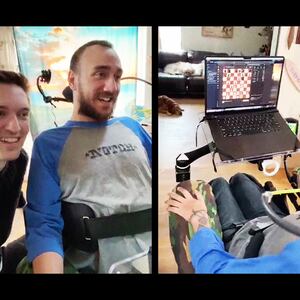Elon Musk’s neurotech startup Neuralink said Wednesday it has run into problems with a brain chip it implanted into a 29-year-old quadriplegic man earlier this year, with the issues considered so serious, it reportedly considered having the implant removed entirely.
In a blog post announcing the issues, Neuralink said its test patient, Noland Arbaugh, has begun losing the ability to efficiently control some technology using only his thoughts—the entire selling point of Neuralink.
Neuralink said those failures were caused by some of the implant’s 64 threads retracting and becoming unusable. It didn’t specify how many of the threads—the microscopic links that transport his brain signals to a chip that allows him to control technology with his mind—were impacted, nor did it say what caused the error.
People familiar with the issue told The Wall Street Journal, however, that the thread retraction was partially the fault of air that’s remained trapped inside Arbaugh’s skull which stems from the brain surgery that installed the implant, a condition known as pneumocephalus.
Sources told the Journal the problem doesn’t appear to pose a risk to safety of Arbaugh, who’s been paralyzed since a 2016 diving accident, but some at Neuralink “floated” the possibility of having the implant outright removed.
It’s the first real hiccup for Neuralink, which has been highly controversial since its inception. The company remains in its infancy, with Arbaugh being part of a six-year test of its tech that it hopes will eventually be used worldwide.
Neuralink says its goal is to return a relative sense of normalcy to those with full-body paralysis, like Arbaugh. In media releases, Neuralink showed previously that Arbaugh had regained the ability to do some tasks thanks to the chip—like playing video games using only his mind.
The chip’s threads are nearly microscopic, meaning they have to be inserted using a specially-made robot. Those who receive the implant have it placed directly on their brain, enabling it to read neural signals and turn them into cursor movements.
The company’s blog post said the retracted threads led to a reduction in bits-per-second, slowing down both the speed and accuracy of Arbaugh’s ability to control a computer cursor using his mind. The company said it was addressing the issue by modifying its algorithms that improved bits-per-second.
Despite its recent deficiencies, Arbaugh appears to still be enjoying the technology. Neuralink livestreamed a demonstration of Arbaugh playing chess in March, and, on Saturday night, Arbaugh also livestreamed himself on X using the implant to navigate around his computer screen.
If the FDA gives its approval again as it did for Arbaugh, Neuralink hopes to complete an additional 10 implants before the end of 2024.







